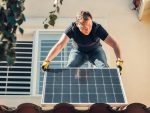Tried and tested ways to reduce energy usage at home
Since the pandemic, both Mr H and I have worked from home so our energy usage has increased over the last couple of years. We’ve had to power our laptops and monitors and of course, the kettle has been put through its paces too. However, with energy prices going up significantly from April 2022 I’ve been looking at ways to reduce our usage.
We switched over to a Smart Meter around a year ago so we have a monitor that will show us just how much gas and electricity we are using on a daily basis. Before I started trying to reduce our usage, we were using on average around £5/6 a day on both gas and electric. Since putting in these new measures below we have now got this down to around £4 a day – saving of £1-2 a day which is £30-£60 a month! Obviously, these figures will change now that the price increase has hit but I am pleased that by just making small changes we’ve been able to reduce our usage.
https://www.instagram.com/reel/Cb0SURIlPWn/
Here are the things we changed to reduce energy usage at home
Heating
Turn thermostats down, only heat the rooms you need
When the boys are at school, we don’t need to heat the upstairs of our house so we turn the thermostats in all the rooms upstairs to 0, heating just the downstairs to keep us warm. We also lower the thermostats as they don’t all need to be blasted on full power.

Install Smart heating, turn the temperature down a few degrees
We had Hive installed last year when we upgraded our boiler to a more energy-efficient combi. Having it has meant we can easily schedule the heating to only come on when it dips below a certain temperature. Equally, it will know how long it takes to get the house to a set temperature and will switch off when that temperature has been reached.
On the other hand, stove inserts are a great way to add some extra warmth to your home. With the touch of a button, you can have a cosy fire going without having to worry about gathering firewood or cleaning up ashes. Be sure to research the best pellet stove insert for your home and have it professionally installed for optimal safety and efficiency. Also, consider adding a smart thermostat to your heating system. These devices can learn your schedule and automatically adjust the temperature for optimal energy usage.
Make use of the heat from the oven
Open the oven door after cooking to allow the heat to warm up the kitchen and surrounding rooms.
Water
Don’t wash up using a running tap
I am SO guilty of doing this when washing up but I have now switched to only washing up with a sink full of water.

Only use hot water when necessary
For a quick wash of hands, we turn the cold tap on instead of hot to save the boiler coming on using up gas and electric.
Time your showers
We picked up a 4-minute shower timer a while ago when I visited The London Museum of Water and Steam so I’ve been making sure we all try and stick to it so we don’t waste water!

There are also a number of water-saving devices (including the shower timer) you can order from your local water company.
Turn off tap when brushing your teeth
The boys are always leaving the tap running when brushing their teeth so we’ve bore it into them to stop doing this.
Appliances
Don’t leave devices on standby, switch off from the mains and make use of smart plugs

Mr H thought I was mad when I went round one evening switching everything that wasn’t in use off. It seems excessive but it really does make a difference. One of the things that cost the most to run on standby is your TV and also any gaming consoles like Playstations.
We now have the following switched off (unless they are in use of course):
- Microwave,
- Kettle
- Toasters
- TV
- Games consoles
For things that are not easy to just switch on and off (such as phone chargers behind bedside tables), I use a smart plug so I can switch them on and off using the app. I am not sure if it saves as much energy as switching off directly from the mains but I figured it was better than being left on!
Use the Eco setting on your washing machine

I am so used to putting my washing on and adjusting the time so it’s the shortest cycle – thinking this was more economical but this actually uses more energy.
If you have an Eco setting on your machine – use this as it does what it says on the tin and is more energy-efficient to use. The eco setting on mine takes 3 and a half hours so I do have to be more organised by making sure I either use the timer to come on at a set time or I pop the wash on first thing in the morning.
If you don’t have an eco setting on your machine, wash your clothes at 30 degrees instead of 40.
Invest in a flask for hot water

Working from home, you can imagine how often the kettle is boiled for hot drinks. Whilst we do always only fill the kettle to how many cups we need, I worked out that it was costing around 3p each time. Again, this doesn’t sound like much but if were to boil the kettle say 4 times a day, that easily amounts to nearly £4 a month!
Lights
Use energy-efficient bulbs
This has been more of a gradual change over the years but we have replaced all our lights with energy-efficient LED bulbs. They last longer than traditional bulbs and use less electricity.
Other things you can do
- Turn your combi-boiler onto Eco mode. This stops it from pre-heating water in advance of when you need it (wasting energy)
- Use blankets to keep warm instead of putting the heating on
- Only use dishwasher when it’s full
- Use a slow cooker to cook meals
- Insulate your loft
- Keep doors closed to keep heat in
- Draft proof windows and doors
- When decorating, consider using Thermal lining paper to retain heat
- Insulate hot water pipes
**UPDATE 25 Aug 2022**
Since writing this earlier in the year (April 2022), energy costs have continued to rise and they don’t look like stopping anytime soon. If the media is correct, rates could rise to worrying levels, so over the past months, I’ve been looking at more methods to reduce our energy usage and make things more efficient.
One thing I have been looking at for a while is a water softener, primarily to help Mr H’s eczema. In researching how this can benefit those with dry skin, I also found that it will help reduce energy bills by removing the limescale from your home, allowing your appliances and heating system to operate more efficiently.
With the potential to improve Mr H’s skin and lower household bills, we had a water softener installed in mid-July. Just over one month in we’re already seeing the benefits all-round:
- Our gas usage for August 2022 (483.80 kWh) compared to August 2021 (840.2 kWh) is substantially lower at about 40% less (obviously there are a number of variables that are impacting this but it’s a significant drop. I’ll monitor this in the coming months and update.)
- Electricity hasn’t shown an improvement but this was expected with the extreme weather as we’ve had fans and an air-con unit on the go.
- The kettle has no limescale so this is boiling faster
- We’re able to use less detergent by having soft water supplying the washing machine (from 2 1/2 caps down to 2 caps)
- Taps, surfaces, glassware and shower screens require far less cleaning so we’re not having to purchase any descalers and limescale removers
- And as for Mr H’s skin so far it’s showing to have a positive effect. He’s scratching a lot less and his skin is much calmer than before. Fingers crossed this continues.
Do you have any other energy-saving tips that I’ve not mentioned above? Do share them with me in the comments below!
![[AD] ✨ Festive magic for local families in the heart of Guildford ✨
We had the loveliest evening exploring the @guildfordilluminate light trail at Guildford Castle
The trail takes around 30–40 mins
with cosy stops for hot chocolate and toasting marshmallows, it’s a gorgeous Christmas activity for Surrey families.
It’s on until 4th January and makes the perfect festive plan:
🛍️ Christmas shopping in town
✨ The light trail
🍽️ Finish with dinner in Guildford
If you’re looking for a magical, stress-free festive outing with the kids — this is one to add to your Christmas list
📍 Guildford Castle, Castle St, Guildford GU1 3SX
#GuildfordWithKids #SurreyFamilies #ChristmasInSurrey](https://suburban-mum.com/wp-content/uploads/2018/09/589257185_18566118850016840_4432952740767953046_n-180x320.jpg)
![[AD] We went to the newly opened Cha Sha Kingston a couple of weeks ago, and wow — taste bud adventure unlocked! The boys devoured the masala fries and chicken tikka rolls, while we couldn’t get enough of that epic kebab butter curry 😍🍛.
It’s amazing value for food this tasty (and everyone left happy and VERY full!).
Delicious food, vibrant vibes and incredible value — the perfect combo for your next meal.
📍Cha Sha Kingston
43 Surbiton Road, KT1 2HG
🌐 chasha.co.uk
Other Cha Sha locations in Birmingham, Ilford, Southampton and Wembkey
#ChaSha #ChaShaKingston #KingstonEats #FoodieFinds #UKFoodie #FoodReview #KingstonUponThames #FamilyEats #FamilyDining #FoodieKids](https://suburban-mum.com/wp-content/uploads/2016/02/574770541_18560351146016840_6855048070839528040_n-180x320.jpg)

![[AD] We’re a cricket-mad family, so we’re buzzing that @thehundred is back this August! 🏏🔥
To get ready, M tried out the official FREE Activity Pack — and it’s brilliant! 🙌
Packed with fun games, creative challenges and sporty tasks, it’s perfect for getting kids hyped whether you’re at home or on the go.
👉Download yours now (link in bio)
@londonspirit @ovalinvincibles #EveryMomentCounts #TheHundred
#EnglandCricket #CricketFamily #TheHundredCricket #LondonBloggers #Cricket #CricketIsLife #kidsfun](https://suburban-mum.com/wp-content/uploads/2022/11/505472555_18531279601016840_7092520074819907569_n-180x320.jpg)



![[AD - Press visit]
We enjoyed the glorious sunshine this weekend with a trip to Brighton. We went on the @brightoni360official which is right by the sea front.
The i360 pod take a slow journey up, allowing you to take in views across Brighton and the South Downs 450ft above ground. There’s a bar inside with drinks and snacks available to purchase and the experience lasts 25 minutes.
Afterwards, we headed to the open air roller rink for a roller skating session!
The roller rink is:
⭐ Suitable for over 5s
⭐ £6.50 if you have your own skates or £9.50 if you need to hire them
⭐ 45 minutes per session
Full details to visit the i360 + skating
📍 Brighton i360, Lower Kings Road, Brighton BN1 2LN
🚗 Parking nearby (we parked in the Regency Square Car park)
🎟️ Prices start from £25.40 for an adult and £16.90 for a child
🕐 Opening hours are currently Sun-Fri 10.30am-18.30pm and until 19.30pm on Saturdays
☕️ Bar inside the i360, cafe and gift shop
Book tickets here:
https://tickets.brightoni360.co.uk/tickets/?_ga=2.195305772.1869001490.1689671753-1757164059.1689671753/#events?eventid=157](https://suburban-mum.com/wp-content/uploads/2015/04/417980235_313576471048632_3682382982231216432_n.jpg)

![[AD] ***Summer of fun at Barracudas Activity Camps!****
There is plenty for kids to do at @barracudas_activity_day_camps
From Tennis, Archery, Swimming, Motor Sports and more you can be sure that there will be something for kids aged 4.5-14. ⚽🏈🥅🎾🏓🏎️🏹🏊♂️🏉
You can book on a day by day basis - so it can fit in with any other days out/activities you have planned and there are early drop off and late pickup options available. Barracudas are also Ofsted registered so you can use your Childcare Vouchers too.
⭐⭐⭐Get £20 off a week or £4 off a day using my discount code: MARIA20⭐⭐⭐
#BarracudasActivityDayCamp #BarracudasActivityCamp #BarracudaAmbassadors #SummerHolidays #SchoolHolidays #Summer2023 #SummerCamp #DayCare #Camp #KidsCamp #surreymummy #surreymums #SummerOfFun #ActivityCamps #HolidayCamps #Childcare #SchoolHolidays #schoolholidaycamps](https://suburban-mum.com/wp-content/uploads/2024/07/353583570_625625966167953_545896259645102575_n.jpg)



![[AD] We have some super exciting news...we have been chosen to be Laser Quest Ambassadors, and the boys are over the moon!
We are really lucky that our local Laser Quest (@laserquestkingston) is just around the corner from us. It means we can pop in of a weekend or anytime during the school holidays, and with summer just around the corner, I know Laser Quest will be one of our go-to places for some family fun.
As well as games of Laser Quest, there are also VR experiences and arcade amusements too. To find out a bit more about how Laser Quest works, you can read my blog post: https://www.suburban-mum.com/laser-quest-kingston/ (clickable link in bio)
Don't forget to keep an eye out for our Laser Quest posts - I'm going to be giving away two family passes to use at Laserquest Kingston!
If you can't wait and want to head down to Laser Quest to try it out, use the code SUMMER30 for 30% off your booking. The code is valid from now until the end of August 2023 and can be used on Laser Quest games and birthday party bookings.
#LaserquestAmbassador #Laserquest #LaserquestKingston #ActivitiesForKids #FamilyFun #DaysOutWithKids #Lasertag #LaserquestVR #Kingston #ThingsToDoInKingston #SurreyFamilyDaysOut #ThingsToDoWithKids #RainyDayFun #SurreyMummy #SurreyLife #LifeWithKids #LifeWithBoys #familyfunday](https://suburban-mum.com/wp-content/uploads/2015/04/353230107_797358078406942_2405522556733455165_n.jpg)

![[AD] The sun has finally made an appearance and the boys have been making the most of it by spending it
in the garden.
They’re go-to is always football and they’ve been trying to improve their aim and accuracy with the new Messi Foldable Footlball goal from the #MessiTrainingSystem range.
I love the fact the goal is foldable, making it easy to store away when not in use. It is also lightweight so you can effortlessly pack it up and take it to the park or to a friend’s house.
The Messi Foldable Football Goal retails at £36 and can be purchased from @argos
You can read my full review here: https://www.suburban-mum.com/messi-foldable-football-goal/
#TrainLikeMessi #FoldableFootballGoal #FootballSkills #OutdoorFun #LionelMessi #LeoMessi #FootballAtHome #OutdoorKids #JustGetOutside #OutdoorsAndFree #ScreenFreeKids #WhateverTheWeatherKids @flair_gp](https://suburban-mum.com/wp-content/uploads/2015/04/341194882_615024710178056_41977149395989448_n.jpg)

![[AD] We are absolutely thrilled to announce that we are Barracuda Ambassadors again this year.
With Easter just around the corner, the boys were sent the @barracudas_activity_day_camps new camp kit in preparation for the school holidays.
There’s a wide range of activities for kids aged 4.5 - 14 including Tennis, Archery, Basketball, Arts & Crafts and more.
If you like the sound of Barracudas, find out more over on their website. You can also save £20 a week or £4 a day, using my discount code: MARIA20](https://suburban-mum.com/wp-content/uploads/2024/07/336812306_765234558514317_685553691647241974_n.jpg)





